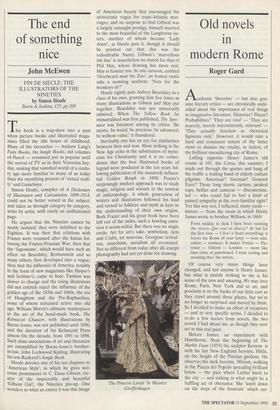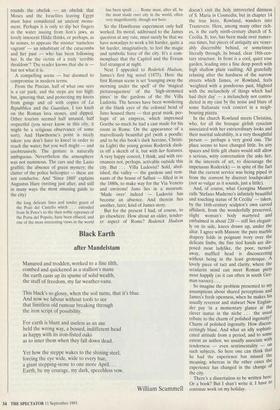Old novels in modern Rome
Roger Gard
Academic 'theorists' — but also gen- uine literary critics — are chronically unde- cided about the importance of real things to imaginative literature. Histories? Places? Probabilities? 'They are vital' — 'They are scarcely, merely intermittently, relevant' 'They actually function as rhetorical figments only'. However, it would take a hard and consistent tenant of the latter views to dismiss the vitality, in fiction, of the brilliant smouldering city of Rome.
Lolling opposite Henry James's old rooms at 101, the Corso, this summer, I made out through the sputter and bang of the traffic a trailing band of elderly culture pilgrims. American? German? General Euro? Those long shorts, tartans, peaked caps, bellies and cameras — disconsolate, led — who could fail to feel a kind of pained sympathy at the over-familiar sight? Yet this was not, I reflected, many yards metres — from the room in which Henry James wrote to brother William, in 1869: From midday to dusk I have been roaming the streets. Que vous en dirai-je? At last for the first time — I live! it beats everything: it leaves the Rome of your fancy — your edu- cation — nowhere. It makes Venice — Flo- rence — Oxford — London — seem like lime cities of pasteboard. I went reeling and moaning thro' the streets.. .
Of course very many things have changed, and not anyone is Henry James: but what is mainly striking to me is his sense of the new and amazing. We may love Rome, Paris, New York and so on, and proclaim it on the backs of our little cars as they crawl around these places, but we're no longer so surprised and moved by them. So I decided to make an effort of recapture — and in very specific terms. I decided to re-do a few scenes from novels, the two novels I had about me, as though they were set in this real pace.
Before James, an experiment with Hawthorne. Near the beginning of The Marble Faun (1859) the sculptor Kenyon is with his fair New England heroine, Hilda, on the height of the Pincian gardens. He observes the dark heroine, Miriam, walking in the Piazza del Popolo spreading brilliant below — the pace where Luther knelt to the city — and sinking in what might be a baffling act of obeisance. She 'knelt down on tile steps of the fountain' which sur-
rounds the obelisk — an obelisk that Moses and the Israelites leaving Egypt must have considered an ancient monu- ment. Perhaps it is only to dip her fingers in the water issuing from lion's jaws, as lovely innocent Hilda thinks, or perhaps, as he senses, to appease the sinister 'nameless vagrant' — an inhabitant of the catacombs and her past — who has been following her. Is she the victim of a truly 'terrible thraldom'? The reader knows that she is but not what it is.
A compelling scene — but doomed to compromise in modern terms.
From the Pincian, half of what one sees is a car park; and the steps are too high; but, ignoring that, and protecting my knees from gunge and oil with copies of La Repubblica and the Guardian, I too knelt on the Roman lava stones, and dipped. Other tourists seemed half amused, half respectful (you never know in this city, it might be a religious observance of some sort). And Hawthorne's point is nicely taken: you don't have to kneel in order to reach the water, but you well might — and unobtrusively. The gesture is naturally ambiguous. Nevertheless the atmosphere was not numinous. The cars and the Lazio graffiti; the absence of green mystery; the clatter of the police helicopter — these are not conducive. And 'Since 1880' explains Augustus Hare (writing just after, and still in many ways the most amusing guide to the city)
the long delicate lines and tender green of the Prati del Castello which . . . extended from St Peter's to the then noble cypresses of the Porta del Popolo, have been effaced, and one of the most interesting views in the world has been spoilt .. . Rome must, after all, be the most made over city in the world, often very magnificently, though not here.
So the Hawthorne experiment only half worked. Its moral, addressed to the James question at any rate, must surely be that we have nowadays to work a bit harder, quite a bit harder, imaginatively, to feel the magic and symbolic force of the city. It's a com- monplace that the Capitol and the Forum feel strangest at night.
Next I appealed to Roderick Hudson, James's first big novel (1875). Here the first Roman scene is set 'lounging away the morning under the spell' of the 'magical picturesqueness' of the 'high-stemmed pines' in the gardens of the the Villa Ludovisi. The heroes have been wondering at the blank eyes of the colossal head of Juno housed there — that great mask, per- haps of an empress, which impressed Goethe so much he had a cast made for his room in Rome. On the appearance of a marvellously beautiful girl (with a poodle; and to be this book's dark heroine, Christi- na Light) the young genius Roderick dash- es off a sketch of it, but with her features. A very happy conceit, I think, and with res- onances not, perhaps, activable outside this city. But . . . Villa Ludovisi? Sold, abol- ished, the valley — the gardens and rem- nants of the house of Sallust — filled in in the 1880s, to make way for the Via Veneto and environs! Juno lies in a museum. `Made over' indeed — Ludovisi has become an absence. And therein lies another, later, kind of James story.
But for the present I had, of course, to go elsewhere. How about an older, tender- er aspect of Rome? Roderick Hudson
doesn't visit the holy introverted dimness of S. Maria in Cosmedin, but in chapter 14 the true hero, Rowland, wanders into Trastevere. Here, among many other rich- es, is the early ninth-century church of S. Cecilia. It, too, has been made over numer- ous times, but pieces of antiquity are vener- ably discernible behind, or sometimes literally through, its broad, clear 18th-cen- tury structure. In front is a cool, quiet rose garden, leading into a fine deep porch with high shallow plain vaulting. All gratefully relaxing after the hardness of the narrow streets which James, or Rowland, feels `weighted with a ponderous past, blighted with the melancholy of things which had had their day' — a melancholy not contra- dicted in my case by the noise and blare of some Italianate rock concert in a neigh- bouring piazza.
In the church Rowland meets Christina, who, for all the brusque girlish cynicism associated with her extraordinary looks and their marital saleability, is a very thoughtful person — perhaps a very good one. The place seems to have changed little. Its airy spaces and little gilt chairs would still allow a serious, witty conversation (he asks her, in the interests of art, to discourage the impetuous Roderick) — in spite of the fact that the current service was being piped in from the convent by discreet loudspeaker (not so vulgar as it sounds, just a little).
And, of course, what Georgina Masson calls 'Stefano Maderno's infinitely beautiful and touching statue of St Cecilia' — taken, by the 16th-century sculptor's own carved affidavit, from the wonderfully preserved, slight woman's body martyred and embalmed in about 220 — still lies elegant- ly on its side, knees drawn up, under the altar. I agree with Masson: the pure marble drapery folds in poignant ivory over the delicate limbs, the fine tied hands are dis- posed most ladylike, the poor, turned- away, muffled head is disconcerting without being in the least grotesque. A lovely piece of tact and clarity, where the secularist mind can meet Roman piety most happily (as it can often in south Ger- man rococo) .
So imagine the problem presented to my assumptions about shared perceptions and James's fresh openness, when he makes his usually reverent and stalwart New Englan- der pay 'in a momentary glance at the clever statue in the niche . . . the usual tribute to the charm of polished ingenuity! Charm of polished ingenuity. How discon- certingly blasé. And what an idly sophisti- cated attitude from a period, and to some extent an author, we usually associate with tenderness — even sentimentality — on such subjects. So here one can think that he had the experience but missed the meaning; whereas in the other cases the experience has changed in the change of the city.
There's a dissertation to be written here. Or a book? But I shan't write it. I have to continue work on my holiday.



















































 Previous page
Previous page